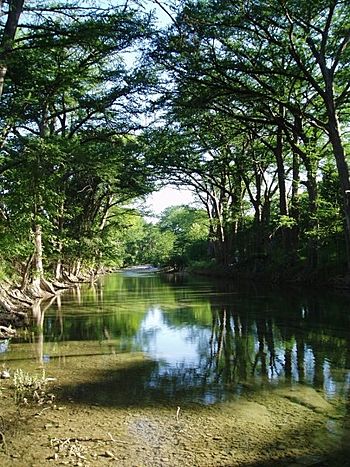Medina River facts for kids
Quick facts for kids Medina River |
|
|---|---|

Medina River near Bandera, Texas
|
|
| Other name(s) | Río Mariano, Río San Jose, Río de Bagres |
| Country | United States |
| State | Texas |
| Physical characteristics | |
| Main source | Bandera County, Texas 29°47′46″N 99°15′19″W / 29.79611°N 99.25528°W |
| River mouth | San Antonio River Bexar County, Texas 128 m (420 ft) 29°14′04″N 98°24′28″W / 29.23444°N 98.40778°W |
The Medina River flows through south central Texas, United States. It is part of the Medina Valley. People also knew it by other names like Rio Mariano, Rio San Jose, or Rio de Bagres (which means Catfish River).
The river starts from springs in the Edwards Plateau. This area is in northwest Bandera County, Texas. The Medina River then flows for about 120 miles. It eventually joins the San Antonio River in southern Bexar County, Texas.
A large structure called the Medina Dam is on the river. It is in northeast Medina County, Texas. This dam creates Lake Medina. Much of the river is managed by the Bexar-Medina-Atascosa Water District. They help provide water for farms and ranches.
Contents
History of the Medina River
How the River Got Its Name
The Medina River got its name from Pedro de Medina. He was a Spanish mapmaker. Alonso de León, a Spanish governor, named the river in 1689. At that time, he was the governor of Coahuila, a part of New Spain.
Old Borders and New Names
The Medina River once marked an important border. It was the official line between Texas and Coahuila. People thought the San Antonio River was a smaller stream flowing into the Medina. Back then, the river was called the Medina all the way to the Gulf of Mexico. Today, the part of the river after it joins the San Antonio River is called the San Antonio River.
A Stop on the Road
From 1849, the town of Castroville was an important stop. It was located right on the Medina River. Travelers on the San Antonio–El Paso Road would stop there for water. It was also a station for stagecocoaches. These coaches carried mail and people on routes like the San Antonio-El Paso Mail and the San Antonio-San Diego Mail Line.
Natural Features of the River
Where the Water Comes From
Much of the Medina River's water comes from springs. These springs appear because of something called the Balcones Fault. This fault line is a very important natural boundary. It separates different types of plants and animals.
A Special Dividing Line
For example, some plants, like the California Fan Palm, only grow west of the Medina River. They are found on the side of the Balcones Fault. This shows how the river and the fault create unique natural areas.
Protecting the River
In the past, the Medina River received a lot of dirty water. This came from fish farms upstream. These farms used too much water. This was not good for the river's health. Now, people work to keep the river clean and healthy for everyone.
 | John T. Biggers |
 | Thomas Blackshear |
 | Mark Bradford |
 | Beverly Buchanan |

